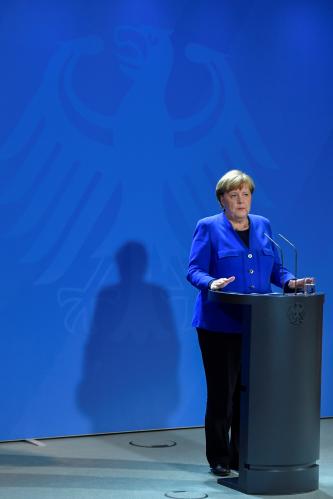With the coronavirus requiring that states take quick action to protect their citizens, constitutional actors like courts, governors, and even citizens must be wary that pandemic responses do not morph into opportunities for authoritarians to solidify control, argues Constanze Stelzenmüller. This post originally appeared in the Financial Times.
It has become a truism to assert that the pandemic highlights the enduring importance of the nation-state. What is less clear, but as important, is what it does to nation-states’ operating systems: their constitutions.
Constitutions provide the legal principles for the governance of states, and their relationships with civil society. They are the rule books that make the nation-state effective, legitimate and decent. Most constitutions — the U.K. and the U.S. are rare exceptions — were forged in the aftermath of the second world war, or the cold war: for peacetime and normalcy. Can they survive the coronavirus crucible?
Hungary’s Prime Minister Viktor Orban has pounced on the crisis to complete his already near-dictatorial powers. He can now rule by decree, with no time limit. Yet claims by illiberal authoritarians that they perform better than liberal democracies handling this challenge do not hold. The disregard for life seen in the battles waged by China, Russia, India, Brazil, and similar regimes against Covid-19 is evidence enough.
But liberal western democracies also face profound quandaries as they try to control the havoc wrought by the pandemic. What is the proper use of emergency powers? How can a proliferating executive be contained? How can individual freedoms be protected against a state with new coercive appetites?
Emergency powers are the exception to the foundation of liberal constitutionalism: the limited sovereignty of the state, which protects individuals from tyranny. This is why most constitutions only permit governments to declare a “state of emergency” under extraordinary circumstances. It is one of the most revealing tests a leader can face.
The French constitution gives the president broad emergency powers, and Emmanuel Macron rushed to assert them early on, declaring that France was “at war”. Yet this week, after much criticism, in a contrite televised address, he admitted mistakes had been made.
President Donald Trump this week told a startled America that his constitutional authority over states is “total”. Ironically, he does have broad statutory emergency powers. But he has used them only once (ordering a company to make masks), contending that the burden of managing Covid-19 falls on state governors and mayors. One critic called this “performative authoritarianism”.
Germany’s Basic Law provides emergency powers in limited cases — but not for a pandemic. So Chancellor Angela Merkel’s government made do by expanding an existing law on infectious disease protection, which was castigated as “excessive self-empowerment”. But Ms. Merkel has also been a model of calm rationality, and empathetic communication.
The pandemic is “the hour of the executive” — as were the 9/11 attacks and the financial crisis of 2008. Everywhere, governments are racing to pass economic packages and ramp up agencies to administer them. The coercive state is also back with a vengeance: putting citizens under house arrest, or letting them out on condition that they submit to intrusive biosurveillance measures, such as compulsory tracking.
As governments morph into the Incredible Hulk, other constitutional actors such as courts, governors and citizens may have to take a step back at first. But the longer the crisis lasts, the more vital it is for them to reassert their rightful roles, and demand that government actions be evidence-based, proportional, accountable and reversible.
That is a lot to ask. Governments are making life-and-death decisions based on imperfect information. There will be a temptation for the executive to overplay a dearth of actionable facts with an excess of assertiveness. These are the moments populists and authoritarians wait for. All the more important, then, not to allow changes now that make their work easier later.







Commentary
Coronavirus is also a threat to democratic constitutions
April 15, 2020